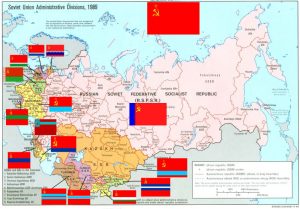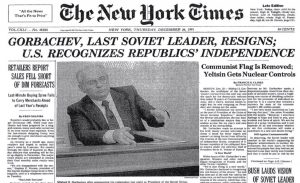I predicted the collapse of the Soviet Union but no one knows that
Pauline Park
One of the biggest clichés in circulation is the now commonplace observation that no one predicted the collapse of the Union of Soviet Socialist Republics (USSR) — but I did; no one knows that, though, and therein hangs a tale…
In August 1988, I began my Ph.D. program at the University of Illinois at Urbana-Champaign, thinking I would eventually do my dissertation on French foreign policy; my adviser was a leading expert on that topic and his best friend in the political science department was a leading Sovietologist. Prof. Roger Kanet was also a member of my curriculum committee — in our department at UIUC, the prelude to the dissertation committee— and he would eventually serve on my dissertation committee as well; so even though I never had a single course with him, he was still an important figure in my life as a graduate student.
Roger Kanet has been the primary editor of 36 books and five special journal issues and has contributed over 155 chapters to edited volumes as well as getting 95 peer-reviewed journal articles published, according to Wikipedia — a renowned Sovietologist and the leading expert on the Soviet Union in my department when I was pursuing my Ph.D. Prof. Kanet loomed large and he and I were on friendly terms; because he was my adviser’s best friend in the department, he was something like the academic equivalent of my department uncle; so when he decided to pull together an occasional brown bag lunch for informal discussions of Soviet politics and current affairs, I was happy to join even though it was not my area of specialization. I did however take a course in Soviet politics with an assistant professor on tenure track in the department and learned a great deal from his course; but I never pretended to have any expertise in Soviet politics or history.
At one of the brown bag lunches in the spring of 1989, Prof. Kanet was talking extemporaneously and casually about Soviet politics when I said quite spontaneously that I thought the Soviet system would collapse and perhaps sooner rather than later; Kanet was absolutely gobsmacked (to use a British expression) by what he clearly regarded as uninformed and even foolish speculation by a grad student who did not speak or read Russian and was not specializing in Soviet politics; I can’t remember his exact words, but his brief response to me was a withering negative.
Both because I had no expertise in Soviet politics and because Kanet’s continuing goodwill was so important to me and my future in the department, I did not follow up with another response; but I was ultimately vindicated by history when the Berlin Wall fell in November 1989, Germany was reunified in October 1990 (‘Tag der deutschen Einheit‘) and Mikhail Gorbachev was forced to dissolve the Soviet Union in 1991.
Given my lack of status and expertise, making a prediction such as the dissolution of the Soviet Union in a peer-reviewed journal article was not an option, but at least in theory, I could have written a short piece for the Daily Illini or the Champaign-Urbana News-Gazette; but even a short piece under my name would have risked antagonizing Roger Kanet and it most likely would not have been published under a pseudonym. In short, there was never any realistic chance of documenting my prediction even if I had considered doing so at the time, so I have to content myself with the realization that I was prescient and that my intuition was a genuine flash of insight unencumbered by decades of expertise as Roger Kanet was in his abrupt dismissal of my prediction.
Only eight years later, my brief academic career would come to an abrupt end and I would make a professional transition (as well as a gender transition) into activism; and even the genuine expertise on the European Union I accumulated in researching and writing my dissertation on the Maastricht Treaty did not position me to establish a position as an expert on EU affairs; instead, media ask me mainly about lesbian, gay, bisexual and transgender (LGBT) issues and especially for comment on transgender identity and politics and that is all perfectly fine with me; but my spontaneous prediction the impending end of the Soviet régime proves to me that sometimes decades of research and writing can actually cloud one’s perception while a simple intuition unencumbered by actual expertise can produce at least a brief flash of insight that can illuminate the truth of a situation more than a cascade of credentials.
Pauline Park received her B.A. in philosophy from the University of Wisconsin-Madison in 1982, her M.Sc. in European studies from the London School of Economics & Political Science in 1983 and her Ph.D. in political science from the University of Illinois at Urbana-Champaign in 1994; she wrote her master’s thesis on the politics of French economic policy under the administration of François Mitterrand and her doctoral dissertation on the Maastricht Treaty on European Union; she was the first student at any University of Illinois campus to win a Fulbirght fellowship for France.

